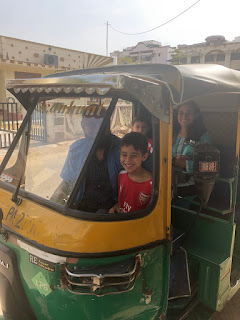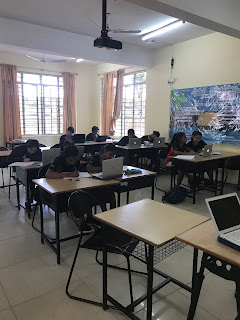Caste Part II
This is a picture of my Professor who teaches a class on Class, Caste, and Gender. I have learned so much from him in so many ways. Not just in class but also riding the bus together. He is a true sociologist and a deep thinker. I have the upmost respect for him.
For my part II on Caste in India I would like to share with you two links:
1. Ambedkar, B.R. “The Annihilation of Caste,” 1936. http://ccnmtl.columbia.edu/projects/mmt/ambedkar/web/readings/aoc_print_2004.pdf.
"The Annihilation of Caste" was a speech prepared by B.R. Ambedkar and he was not allowed to deliver the speech because of the controversial topic of caste and how he thinks that "the real remedy for breaking Caste is inter-marriage. At the end of his speech there is a letter from Mahatma Gandhi responding to his speech. If you are interested it is worth a read.
2. Madan, Amman. 2017. “Modernity and Meritocracy: Searching for a Fourth Way.” Economic and Political Weekly 52 (47)
This is from my very own Professor. In this article he talks about meritocracy and shifting to a person's ability rather than birth as the basis
for social roles and rewards.
Combining these thoughts and thinking about how to eradicate the Caste System it seems to me, who is an outsider, that eliminating the Caste System is very complicated. In order to address caste one must address class inequalities and political inequalities. India is beginning to figure it out. They have started by having reservations/quotas for jobs and Universities to accept people who come from a lower caste. It really is complicated and deeply rooted in Hinduism and there is no easy answer. Slow progress is a good thing. How to push it along? I am not sure how to answer that. I still go back to education as another avenue to help move the thinking out of a Caste mentality. I am very interested to hear from the other students of the class. Next week our assignment is to make a Caste Curriculum for 9th and 10th standard. I wonder how they will approach it?
I am very thankful for my parents and for not introducing us to the Caste System (Thank you mom and dad)! I grew up knowing about it but learning that it is not something really practiced. And that it is more prevalent in rural/village areas than in the cities. I wonder though if it is silently practiced in the cities? Meaning it is not outwardly talked about but is in the back of one's mind? In my class, I also learned that it is still very prevalent in rural/village areas. See this below video. You can just watch the first 15 minutes and understand what is happening.
India's Forbidden Love: An Honour Killing on Trial | Witness
Lastly, I really appreciate my Acharya (spiritual leader) at the Chinmaya Mission back home where she teaches us the Hindu scriptures in a dynamic way. She helps us learn about Hinduism and how to make meaning of the scriptures as it relates to our lives today. My takeaway is that logic and reasoning is very important when thinking
about religion. One needs to practice religion with reflection as it relates to oneself and the world around them, otherwise we are
blindly following religion. I am very thankful that I have found my way as it relates to religion and how I think about it. I also understand that religion is not everyone's cup of tea. I am simply reflecting on my own experiences and thinking about as it relates to me and my life.




Comments
Post a Comment